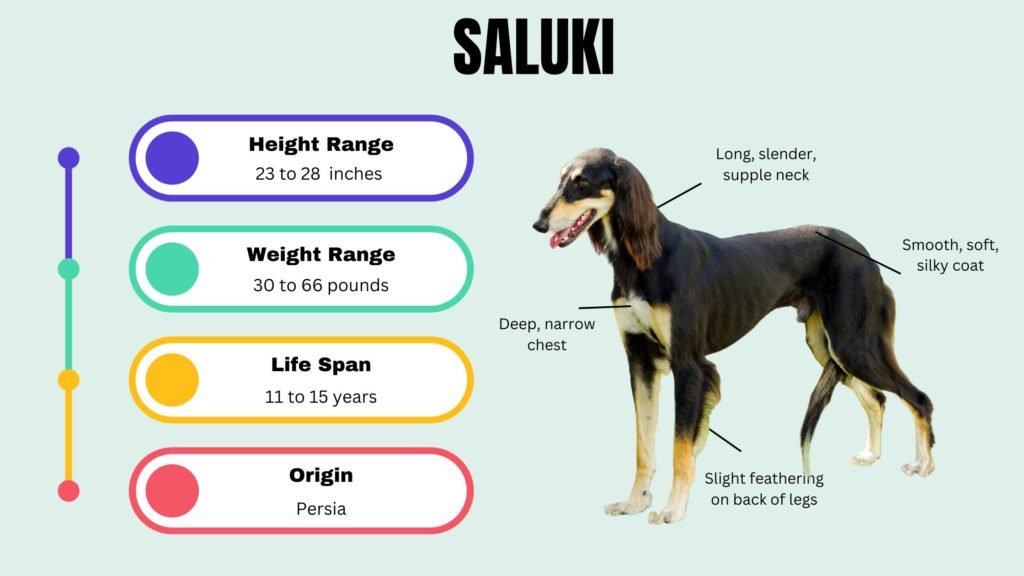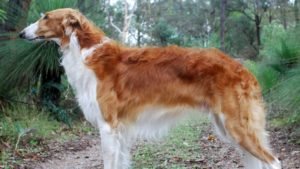Saluki History
The Saluki, often considered among the oldest dog breeds, has a history steeped in the sands of time. Originating from the Middle East, it is believed that the Saluki’s roots can be traced back to ancient Egypt, Mesopotamia, and Persia. Historical artifacts, including sculptures and paintings, have depicted the Saluki alongside pharaohs and other influential figures, making this breed a living piece of history. This elegant sighthound was highly esteemed for its remarkable hunting abilities. Even today, the Saluki remains closely tied to traditional hunting practices in its native regions.
Fast forward to the 19th century, the Saluki gained recognition in the Western world, particularly in England. It was only in 1927 that the Saluki Club of America was formed, and by 1929, the American Kennel Club officially recognized the breed. This added a new chapter in the Saluki’s history, as it transitioned from a prized hunting companion to a show dog and family pet in different parts of the world.

Saluki Characteristics
When it comes to characteristics, the Saluki is a sight to behold. This slender, graceful canine has long legs built for speed, making it one of the fastest dog breeds, capable of running up to 40 miles per hour. A deep chest and lean body contribute to its athletic prowess. Its coat can be smooth or feathered in white, cream, fawn, black, and tan colors. The eyes are typically dark and almond-shaped, exuding a charisma that adds to the Saluki’s overall allure.
However, more than the physical attributes make the Saluki a standout breed. They are brilliant, though their independent nature sometimes gets them labeled as aloof or stubborn. The Saluki’s strong prey drive is inherited from its hunting days. Though they can be trained to live harmoniously with other pets, it’s crucial to understand that the Saluki’s instinct to chase is hardwired into its genetic makeup.
Saluki Personality
Understanding their personality is essential to bring a Saluki into your home. These dogs are known for their reserved yet affectionate nature. They may not be the type to shower you with constant licks and wagging tails, but their love is genuine and deep-rooted. The Saluki tend to form strong bonds with their human family, often becoming particularly attached to one individual.
Contrary to their regal appearance, Salukis have playful and curious personalities. They enjoy exploring their environment but will also relish comfortably curled on the couch next to you in quiet moments. As a breed, Salukis are sensitive to their surroundings and respond well to calm, assertive leadership.
One important consideration is that a Saluki is not an ideal choice for families with small children or other small pets. This breed’s strong prey drive and natural inclination to chase can make it a less-than-ideal match for households with members who are smaller and more vulnerable.
While the Saluki makes for a loyal and loving companion, they are not necessarily the easiest breed to train. Their intelligence is paired with a streak of independence, so they’re sometimes only eager to please. Training a Saluki requires patience and positive reinforcement techniques; harsh training methods are not working well in this breed.
Saluki Life Span
A Saluki’s life span is one of the longer ones among dog breeds, often reaching 12 to 14 years. This extended life expectancy means prospective owners should be prepared for a long-term commitment. Regular veterinary check-ups and a balanced diet contribute to the Saluki’s overall health and longevity. Genetic factors also play a significant role, and reputable breeders aim to minimize congenital health issues through responsible breeding practices. As with any breed, a Saluki’s life span can be influenced by its general health, lifestyle, and the quality of care it receives.
Saluki Family Life
The Saluki may initially seem reserved, but it becomes a devoted and loving member once integrated into a family. Due to their sensitivity and strong bonds with human family members, they are often better suited to households where they won’t be left alone for extended periods. Contrary to some beliefs, the Saluki can fit well into family life, especially with older children who understand the dog’s unique needs and temperament. However, because of their strong prey drive and inherent speed, a securely fenced yard is essential for families considering adding a Saluki to their home.
Saluki Habitat and Diet
Traditionally accustomed to the arid desert regions, the modern-day Saluki has adapted well to various living environments, including urban settings. However, they require ample space to run and expend their abundant energy. Regarding diet, the Saluki has a surprisingly modest appetite for such an athletic breed. Premium-quality dog food with lean proteins and essential nutrients is generally recommended. Some owners prefer a more “ancestral” diet miming what the Saluki might have eaten in its original habitat. Still, it’s essential to consult a veterinarian for personalized dietary advice.
Saluki Temperament
The Saluki’s temperament is a complex blend of contrasting traits. While they’re often aloof or reserved, particularly with strangers, they can also be incredibly affectionate with their human families. Salukis are generally not exuberant or overly demonstrative in their affections, but their loyalty is unquestionable. Intelligence and curiosity are also vital aspects of their temperament. Training a Saluki can be challenging due to their independent streak, but they are quick learners when motivated.
Saluki’s Behavior With Other Animals
When it comes to interactions with other animals, the Saluki’s behavior is heavily influenced by its strong prey drive. Due to its natural hunting instincts, small animals such as squirrels, cats, or even smaller dog breeds can trigger its urge to chase. However, many Salukis can coexist peacefully with other dogs, primarily if raised together from a young age. It’s important to note that their socialization experiences are crucial in determining how well they get along with other pets. If you have multiple animals, we recommend closely monitoring the Saluki until you’re confident they have established a harmonious relationship with the other animals.
Saluki Coat Color And Grooming Requirements
Salukis boasts a rich palette of coat colors, adding another layer to their allure. These elegant canines are a sight, from pristine whites to deep blacks and tans. Feathered Salukis flaunt silky, flowing hair gracing their ears, tails, and sometimes even legs, whereas the smooth types have short, sleek coats. The grooming process differs slightly for each. A weekly brushing removes loose hair and redistributes natural oils for the soft fur. Feathered Salukis, however, may require more frequent grooming sessions to prevent matting and to keep the feathered areas clean. Salukis generally lack the “doggy odor” common to other breeds, but this does not negate the need for regular bathing and skin care.
Saluki Health
Salukis are generally a robust breed, but that shouldn’t warrant complacency in health care. Potential genetic issues such as hip dysplasia and heart conditions are worth monitoring. Regular veterinary check-ups are vital, especially since early detection and treatment can be life-saving. They have a lean build, making them susceptible to obesity if overfed. Maintaining an ideal weight requires diligent monitoring and appropriate diet adjustments.
Saluki Price
The Saluki is not a budget-friendly breed. With puppy prices averaging between $1,500 and $2,500, acquiring one is a significant investment. And this is just the tip of the iceberg; you must also account for vaccinations, preventative healthcare, and feeding. You’re looking at a substantial financial commitment throughout the dog’s life. Nonetheless, the incomparable companionship of a Saluki is considered by many to be worth every penny.
Salukis Trainability
The Saluki’s blend of intelligence and independence creates an exciting training experience. While they’re apt learners, their attention can wane with repetitive and dull tasks. Training methods should focus on positive reinforcement and various activities. Early socialization is also crucial, especially if you have or plan to have other animals in the house. Despite their independent nature, they can shine in obedience and agility trials with the right motivation and techniques.
Salukis Care
Salukis have unique care requirements that prospective owners should be prepared for. Their high energy levels necessitate ample exercise; a secure yard where they can freely run is ideal, but long daily walks also serve well. They have a low tolerance for extreme temperatures due to their lean physique, necessitating appropriate shelter. A diet consisting of high-quality dog food is crucial, and it’s advisable to consult a vet for specific recommendations based on individual health needs. Emotional well-being is another important aspect; they may not be overly affectionate but form deep bonds with their family and don’t take well to prolonged solitude.



